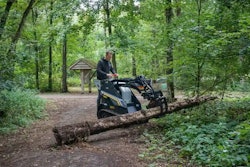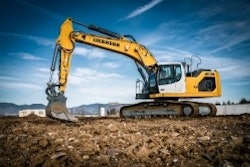Like many young men John and Jim McCaughey started cutting lawns in their early teens. Unlike most contractors who move from residential work to commercial landscaping, the McCaughey brothers decided to stick with residential.
But rather than just mow lawns and trim trees, the brothers identified an overlooked niche in the residential market that was ripe for the picking – landscape design/build work for high-end homes and estates. Landscape maintenance is the foundation of their business mix. The maintenance customers bring a steady flow of design and construction projects such as ponds, pathways, retaining walls, waterfalls and the like.
“Everybody goes after commercial work,” John says, “but it’s too competitive and getting payment can be tricky or slow.” Residential work requires more handholding than commercial work, he admits. “You have to prepare every customer for what to expect. Things get torn up and ugly before they’re finished and you have to educate homeowners.”
Clients in this market also have high expectations. Many are successful corporate CEOs and managers who want the same level of service and professionalism their businesses give to their customers. But offering top-drawer service to top-of-the-line clients has paid off handsomely. After 21 years the brothers have built the company up to $2.4 million in annual sales with 10 permanent employees and about 30 seasonal workers. Business in 2004 was up 30 percent over the previous year and is on pace to do even better in 2005.
As with most successful companies, the ability to recruit and hire the best people is a key part of the McCaughey’s success. Case in point is Charles Simon, the company’s business manager. “Charles had previously held a high-level position in a big software firm, but was feeling stifled in his corporate job,” John says. McCaughey Brothers had done some landscaping work for him, a relationship that eventually led to a job offer and Simon signing on to help the business grow and function more efficiently.
Staying in touch with customers
One of Simon’s innovations was the monthly newsletter, which mixes consumer friendly tips and information. The June 2004 newsletter also carried a short announcement of a fuel price surcharge. The surcharge added less than $7 per invoice for most customers. John thought publishing it might alienate some. Simon felt putting the issue out in front would build trust. But John trusted his employee’s instincts and the strategy worked. Their customers appreciated the honesty and only one person in the entire customer base questioned the increase.
Even with the monthly newsletter, Jim and John felt their company’s culture was still not as customer centered as it should be. To help improve the company’s service attitude John hired Jeff Whiting as the company’s maintenance services manager. “With a young family, the evening and weekend restaurant work was no longer OK for Jeff” John says. Whiting’s restaurant background has brought advance preparation methods, a focus on attention to detail and a much needed concentration on customer service. Whiting was new to the landscape industry, but skilled at bringing many workers together to get a job finished on time and accurately.
Hiring the best, managing them well
When it comes to hiring crews, the company is likewise careful and professional. “We definitely hire for attitude more than skills,” John says. “If a guy is eager to learn and ready to work hard, the rest is easy. A lot of times you can tell just by the body language. If a guy is sitting back in his chair telling us about how much he knows and how he did it when he had his own business, that’s not good.”
The company also started using Mexican laborers in the past few years. They hired an immigration consultant to make sure all the paperwork was correct. Then they set up all the Mexican workers with direct deposit and ATM/debit cards to simplify their finances and prevent them from having to carry around large amounts cash.
John also realized he had to manage this group differently. New arrivals get an orientation briefing, and three times a year the company uses a Spanish speaking human resources consultant to conduct exit interviews to probe for workplace concerns, ferret out safety issues and solicit feedback and new ideas for running the business better. McCaughey’s supervisors and managers take weekly Spanish language lessons in the winter, but having the consultant do regular interviews helps the company discover problems the immigrants may not feel confident discussing with a supervisor.
The first year John employed Mexicans he didn’t get the skills that best suited the company’s needs. So that winter, when his Mexican supervisors went home for the holidays, he asked them to bring back workers with specific skills – masonry especially – that would complement what the company was doing. The strategy was a great success and the company now has a group of highly skilled masons who have allowed it to further expand what it can offer clients in terms of masonry structures and designs using premium materials such as granite and marble.
Downtime is deadly
Although the brothers started the company with a mixture of new and used equipment, John says they buy almost all their equipment new now, especially trucks. “Downtime kills us,” he says. “We’re much better off running new equipment and having the used equipment as a backup.” The company keeps its trucks for a long time, but turns over its mowers on a more frequent schedule.
Maintenance and repairs on the trucks and loaders are outsourced 100 percent. The crews do some routine maintenance on their concrete saw and rammers but likewise outsource repairs on this light equipment. “We don’t have mechanics on the staff,” John says. “We probably will at some point, but for now this seems to work.”






